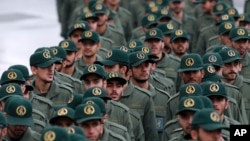The U.S. on Tuesday imposed new sanctions on a network of 25 individuals and entities in Iran, Turkey and the United Arab Emirates it accused of laundering more than a billion dollars and euros that were used by Iran's Revolutionary Guard Corps and defense ministry to fund terrorism in the Middle East.
U.S. Treasury Secretary Steven Mnuchin said in a statement the U.S. was "targeting a vast network of front companies and individuals" in the three countries "to disrupt a scheme the Iranian regime has used ... to exploit the international financial system to evade (U.S.) sanctions, while the regime funds terrorism and other destabilizing activities across the region."
Sigal Mandelker, the Treasury undersecretary for terrorism and intelligence, said central to the funding was the Revolutionary Guards-controlled Ansar Bank and its currency exchange arm, the Ansar Exchange, "both of which used layers of intermediary entities to exchange devalued Iranian rial ultimately for dollars and euros to line the pockets" of the Revolutionary Guards and Iran's Ministry of Defense and Armed Forces Logistics.
"This vast network is just the latest example of the Iranian regime's use of deceptive practices to exploit the global financial system and divert resources to sanctioned entities," Mandelker said. "This once again exposes to the international community the dangerous risks of operating in an Iranian economy that is deliberately opaque."
The U.S. claimed that to secure the funding for Ansar Bank, the Revolutionary Guards, the defense ministry and the Ansar Exchange used a network of front companies and agents in Turkey and the UAE. The Treasury Department said that in the last year and a half, UAE-based Sakan General Trading, Lebra Moon General Trading and Naria General Trading, along with the Iran-based Hital Exchange, provided about $800 million in funds to the Ansar Exchange. In addition, it said Turkey-based Atlas Doviz acted as a secondary foreign currency provider for Ansar Exchange.
The U.S. said the defense ministry and armed forces logistics agency supervises Iran's missile program, including those used by Iran-backed Houthi fighters in Yemen against coalition forces supported by the U.S.
In all, the Treasury sanctions targeted eight individuals, all of them officials at the several financial institutions the U.S. alleged were part of the scheme to provide the funding for the Revolutionary Guards and the defense ministry.
The sanctions freeze any property and funds the targeted officials and entities might have in the United States and block Americans from conducting any business with them. The Treasury said that any foreign financial institution that transacts business with the sanctioned entities and individuals could also be subject to U.S. blacklisting.





